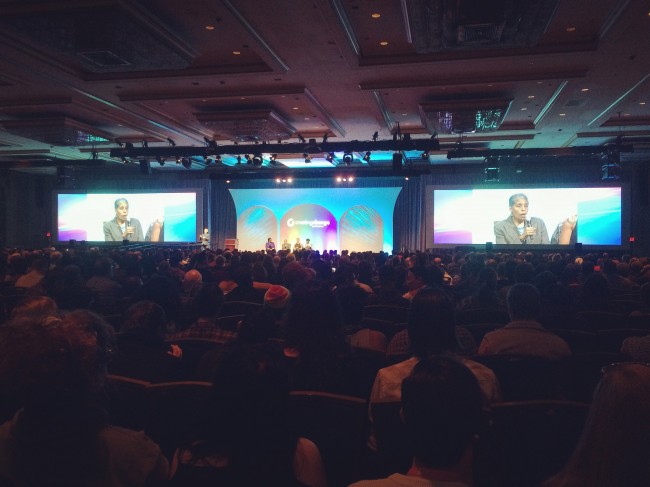Creating Change – Marty B. Tracy
The National Conference for LGBT Equality: Creating Change is an annual event. It’s truly a one-of-a-king organizing and skills-building event for the LGBTQ community and allies. The 28th annual Creating Change conference was held in Chicago, Illinois, this year. Vanderbilt Divinity School student delegates Shakiya Canty, Levi Dillard, Sarah Jordan, and Marty B. Tracy attended along with The Carpenter Program’s Carlin Rushing (Program Coordinating Fellow) and Lyndsey Godwin (Assistant Director).The Embodiment of Abundance
by Marty B. Tracy, MDiv’3
What does it mean to occupy space in this world with a mentality of abundance? I have been thinking about this question since I attended the National LGBTQ Task Force’s annual Creating Change conference with a group of Vanderbilt Divinity School students and alumni/ae. The Task Force brings together thousands of people each year to explore issues related to the intersectionality of race, gender, sexuality, socio-economics, ability, and the various other factors that so often marginalize people within their everyday lives. The potentiality for learning and growing at Creating Change can be limitless, if one wants to imagine a world without limits.
I bumped head-on into a mentality of limits and scarcity on my first day. I attended a day-long institute on the incorporation of the harm reduction model into working with LGBTQ youth. During the afternoon, we had options for 30-minute break-out sessions, and I decided to join one that had “lesbian” in the title. While I usually describe myself as a gay woman, I thought that if the title specifically had lesbian in it, I would be interested in seeing who joined this conversation and what they had. Sure enough, a beautiful, honest, and vulnerable dialogue emerged among a group of female-identified people who sleep with other women about why they do (or do not) identify with the term “lesbian,” the prevalence of trauma within female communities (and how this trauma overlaps with substance abuse), and experiences of overlapping sexism and heterosexism. As the break-out time concluded, members from the other sessions began to regroup into our larger room, and a young man, doodling on his phone, sat down near us. Our small talk continued, and the man looked up, glanced around at where he was within the room. Then he said: “Oh no, I’m sitting with the lesbians.” He wasn’t kidding (not like it is ever okay to joke in a disparaging manner). We looked at him, gaping with disbelief. I think that someone responded to him, but honestly, I was still caught off-guard. As I went onto the rest of the conference, this interaction stuck with me. Most unfortunately, I encountered more difficult moments, which reminded me that sexism is alive and well…even at a place like Creating Change. I discovered that women who identify as “Lesbian” feel a sense of erasure at Creating Change within the conference’s programming. There was a deep lament in feeling called to do work within the LGBTQ community and in recognizing that so much of this work needs to focus on legal, medical, and social support for the Transgender community (and in stopping the murders of Transgender People of Color). Yet, there were experiences of pain and trauma within the lives of these women as well…reasons why these women choose to identify as Lesbian and stories about racism, sexism, and heterosexism that need to be shared with others in a safe space.
This all made me think about the way that capitalism shapes us to think of the world in terms of scarcity – that all resources and power are finite. We are led to believe that if one group gains accessibility to resources within society, then it is at the expense of another group. But why do we need to approach interactions with fellow humans with our minds pre-programmed toward scarcity? Power does not need to operate in terms of limitation. If the Kingdom of God urges us to embody abundance, with the ability to feed 5,000 families with five loaves and two fish, then a friend and I can both rejoice together in our gifts and lament our sorrows, which may or may not overlap at all. In fact, sitting with that friend in his, her, or their joys or sorrows does not ever take away my experiences, and vice versa. I can listen to this friend’s story, and she to mine, and we can both walk away understanding the ways in which the particular and the universal can overlap within our own individual human experiences.
 Creating Change made me think about the ways in which we can embody abundance within our own lives. Not only does a lived experience of abundance help us to be more present within the lives of the people around us, it is also an opportunity to say “No!” to all of the “ism’s” that surround us on a daily basis. I hope that by embodying this mentality, I can better understand how power operates within current socio-political structures and strive to usher in abundance that the Kingdom of God reminds us is always there.
Creating Change made me think about the ways in which we can embody abundance within our own lives. Not only does a lived experience of abundance help us to be more present within the lives of the people around us, it is also an opportunity to say “No!” to all of the “ism’s” that surround us on a daily basis. I hope that by embodying this mentality, I can better understand how power operates within current socio-political structures and strive to usher in abundance that the Kingdom of God reminds us is always there.
